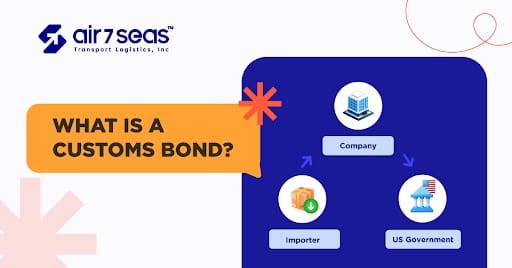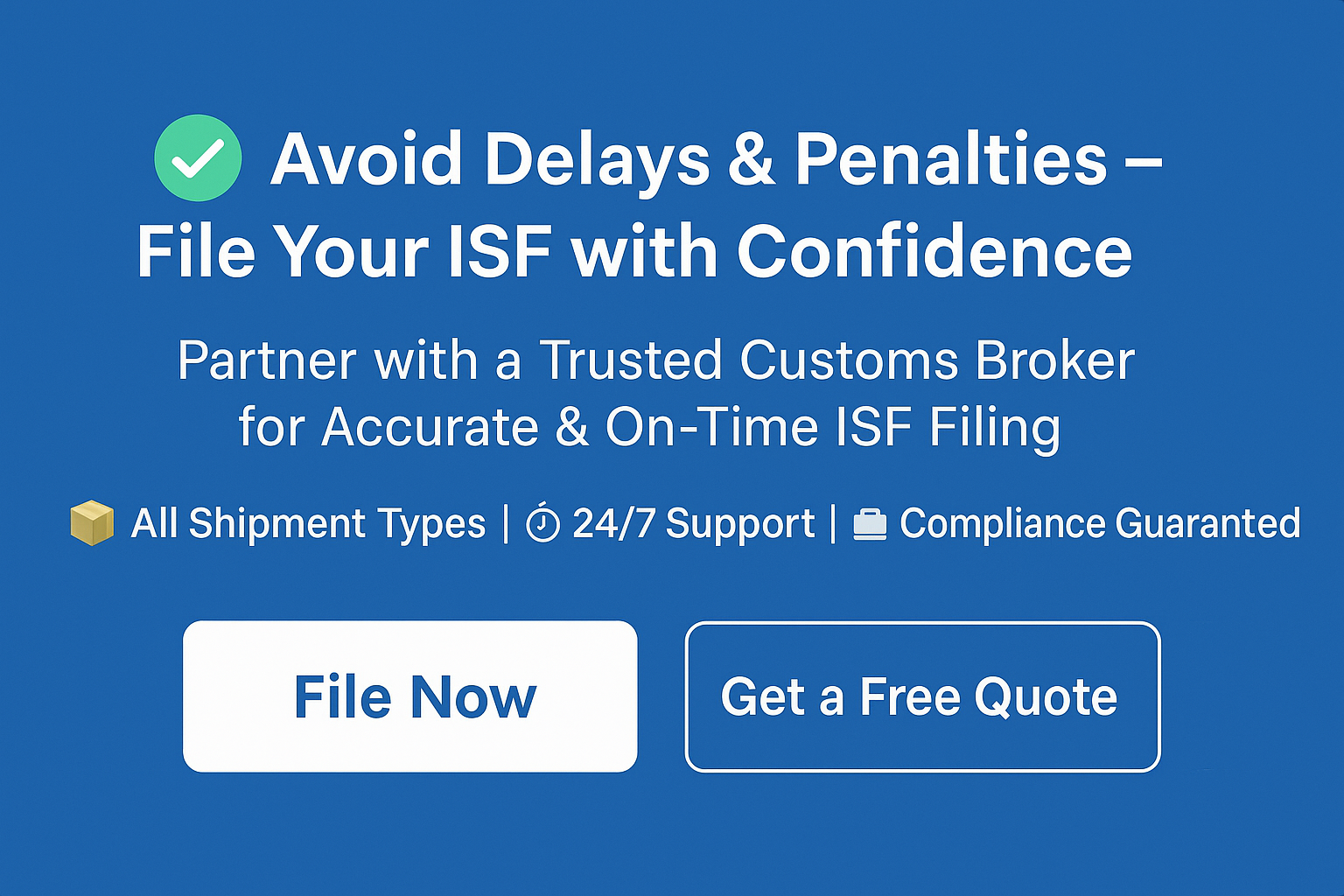
Customs bond is a type of a surety required by the U.S. Customs and Border Protection (CBP) to ensure that importers comply with U.S. regulations and pay the necessary duties, taxes, and fees.
It's a vow between three parties, one is the importer, second is the bonding company AKA the company that provides the bond and the third is the US government.
For instance
If the importer fails to pay the duties or violates any customs regulations, the bond guarantees that the U.S. government will still receive the cash. The company would then have to repay the bond provider.
There are two main types of customs bonds depending on your import frequency and shipment volume one is Single Entry Bond and the other is continuous bond.
Note - A customs bond is typically required if the value of your imported goods is $2,500 or more, or if your shipment is regulated by another government agency (like the FDA, USDA, or EPA), regardless of value.
Why do you need a customs bond?
So, why do we need a customs bond in the first place?
Well, the bond acts as a financial guarantee that the importer will follow the rules.
Here's why it's important:
- Ensures Compliance with Regulations
- The U.S. Customs and Border Protection (CBP) has strict rules when it comes to importing goods.
- A customs bond ensures that the importer will adhere to these regulations, such as properly declaring goods, paying required duties, and following other rules set by CBP.
- If the importer fails to do so, the bond acts as a backup to cover the costs.
- Prevents Shipment Delays
- Without a customs bond, your shipments may be delayed or even rejected at the port of entry.
- Customs bonds help smooth out the clearance process and ensure that goods can move through customs without any holdups.
- Avoids Fines and Penalties
- If the importer doesn't pay the required duties, taxes, or fails to meet other obligations, CBP may impose fines or penalties.
- A customs bond protects against such penalties by guaranteeing that CBP will be compensated for any shortfall.
- Protects the Government and the Public
- The bond also acts as protection for the U.S. government and the general public.
- If an importer doesn't pay taxes or fees or violates other regulations, the bond guarantees that the government can recover those amounts.
- This helps keep the import process fair and orderly.
- Reduces Risk for the Importer
- For importers, the bond reduces the risk of costly mistakes.
- Having a customs bond in place ensures that any issues related to compliance are handled swiftly, and the importer is less likely to face unexpected charges or legal issues.
- This is especially useful for larger businesses that import frequently and need to ensure they’re always in compliance.
How Does a Customs Bond Work?
When you're getting ready to import goods into the U.S., you'll need to secure a customs bond. This bond acts as a guarantee that you’ll follow all the rules and pay any necessary duties, taxes, or fees. It's kind of like a promise to Customs that you’re doing things right.
If something goes wrong—like if you fail to pay a fee or duty—the surety company (the one who issues the bond) will step in and cover the cost up to the bond’s value. But here’s the catch: you, as the importer, are responsible for paying back the bonding company if they have to cover those costs.
When Do You Need a Customs Bond?
You’ll need a customs bond if you're importing goods into the United States. It’s a requirement for nearly all shipments entering the country, whether you’re bringing in goods for personal use or business purposes. If you don’t have the bond in place before your goods arrive, your shipment may be held up by CBP.
Additionally, if you’re filing an ISF for your goods, you’ll need the customs bond in place as part of your import process. ISF filings are mandatory for most ocean imports, and without the proper customs bond, your goods may be delayed or rejected by CBP.
What are the different types of customs bonds?
Customs bonds are not the same for all types of shipments. There are two main types of customs bond
- Single entry bond
- Continuous bond
What is a single-entry Bond?
A single-entry bond is used for one-time imports and is calculated based on the value of the shipment plus applicable duties, taxes, and fees.
Example:
Imagine you are an importer bringing in a one-time shipment of electronics worth $8,000 from overseas. The U.S. Customs and Border Protection (CBP) requires a bond to cover potential duties, taxes, and fees related to this shipment.
Single-entry Bond Requirements:
- The customs bond will be issued for the shipment's value ($8,000) plus any additional duties, taxes, and fees.
- Let's say the total value of the shipment plus duties is $10,000.
- ➡️ Bond value: $10,000
- The premium for this single-entry bond is usually a small percentage of the total bond amount. For example, if the bond is $10,000, the premium might be around 1% (i.e., $100).
Tip: This type of bond is ideal for importers who only need to cover a one-time shipment or do not have regular shipments that require coverage over time.
What is a Continuous Bond?
A continuous bond is used to cover multiple imports over a 12-month period, and its value is based on 10% of the duties, taxes, and fees paid in the past 12 months, with a minimum of $50,000.
Example:
Now, imagine you're a business that regularly imports large quantities of raw materials for your manufacturing operation. Over the past year, you've imported goods totaling $500,000, with duties and taxes amounting to $60,000.
Continuous Bond Requirements:
- A continuous bond will be issued to cover multiple shipments over the next year.
- The minimum amount for a continuous bond is $50,000, or 10% of the total duties and taxes paid in the previous year.
- Since your duties and taxes for the previous year totaled $60,000, the bond amount would be set at $60,000.
- The premium for this $60,000 bond might cost you around $600–$700 annually, depending on the surety company's rates.
Tip: This type of bond is suitable for businesses that import regularly and need ongoing coverage for multiple shipments over the course of a year. It covers all imports across multiple ports of entry and is often more cost-effective for businesses with high-volume imports.
What is the difference between single entry bond and continuous bond
Why continuous bond is suitable for regular importers
For businesses with frequent imports, a continuous bond offers a convenient and cost-effective solution. If you regularly bring goods into the U.S. or have high-volume shipments, this type of bond can simplify the process by covering all imports for a year without the need to secure a new bond for each shipment.
Here’s why a continuous bond might be the best choice for your business:
- Streamlined Process for Regular Importers
- With a continuous bond, you only need to secure one bond for the entire year. This eliminates the need to go through the bonding process multiple times, saving time and reducing administrative tasks.
- Cost-Effective for High-Volume Importers
- For businesses that import regularly, a continuous bond is typically more cost-effective than purchasing a single-entry bond for each shipment. The premium cost of a continuous bond is based on your duties and taxes over the past 12 months, so it is often a better option for businesses that have frequent and high-value imports.
- Coverage Across Multiple Ports of Entry
- A continuous bond applies to all entries filed under your importer number, regardless of the port of entry. This flexibility is ideal for businesses that import through multiple ports across the U.S., ensuring full coverage without needing a new bond for each individual shipment.
- Ideal for Established Businesses
- If you have an established business with a history of imports, a continuous bond helps ensure that your import process runs smoothly without frequent disruptions. It’s especially helpful for companies that need to handle customs clearance efficiently to meet delivery deadlines.
Are Customs Bonds Refundable?
A common question that comes up is whether customs bonds are refundable.
The short answer is: No.
Whether you have a single-entry bond or a continuous bond, they’re not refundable once paid. However, in the case of a single-entry bond, you might not need to pay for another one the next time you import, which can help save on costs.
On the other hand, with a continuous bond, it’s valid for 12 months, and you can continue using it as long as it’s active.
Are customs bonds negotiable?
The terms of a customs bond are not negotiable in the traditional sense (like haggling a price), but here’s what is flexible:
What’s Fixed:
- The requirement: If your shipment meets certain criteria (e.g., over $2,500 in value, or regulated by another government agency), CBP mandates a bond. That rule is non-negotiable.
- Bond types and amounts: These are based on CBP guidelines. For example, a continuous bond must be at least $50,000 or 10% of your previous year’s duties/taxes—whichever is higher.
What Is Negotiable:
- The bond premium (cost you pay): This is set by the surety company. Rates can vary depending on:
- Your creditworthiness
- Import history
- Type and frequency of imports
- The surety’s internal risk assessment
- This is where you can shop around or work with a customs broker who has access to multiple sureties.
So, while the requirement and bond amount aren’t negotiable with CBP, you can negotiate the cost by comparing quotes from different surety providers.
When Do You Need a Customs Bond?
You’ll need a customs bond if you're importing goods into the United States. It’s a requirement for nearly all shipments entering the country, whether you’re bringing in goods for personal use or business purposes. If you don’t have the bond in place before your goods arrive, your shipment may be held up by CBP.
Additionally, if you’re filing an ISF for your goods, you’ll need the customs bond in place as part of your import process. ISF filings are mandatory for most ocean imports, and without the proper customs bond, your goods may be delayed or rejected by CBP.
How to Get a Customs Bond
Getting a customs bond is easier than you might think. You’ll typically go through a surety company or a customs broker.
They’ll work with you to determine which bond is right for your situation and then issue it. You’ll need to provide some basic information, including your business details and the value of the goods being imported.
Once your bond is in place, you can rest easy knowing that you’re compliant with U.S. regulations, including filing the necessary ISF, and are ready to import your goods without delays.
The closure
If you are importing your goods into the USA, then customs bond is a necessary step. You may be a first time importer or would have shipped hundreds of thousands of shipments but having a right customs bond (and your ISF filed correctly) will help you to stay on the right side of the U.S. Customs
So don't let improper customs bond slow down your shipping process. Get bonded, stay compliant, and import with confidence.
The smoother the bond, the faster your cargo’s home.


